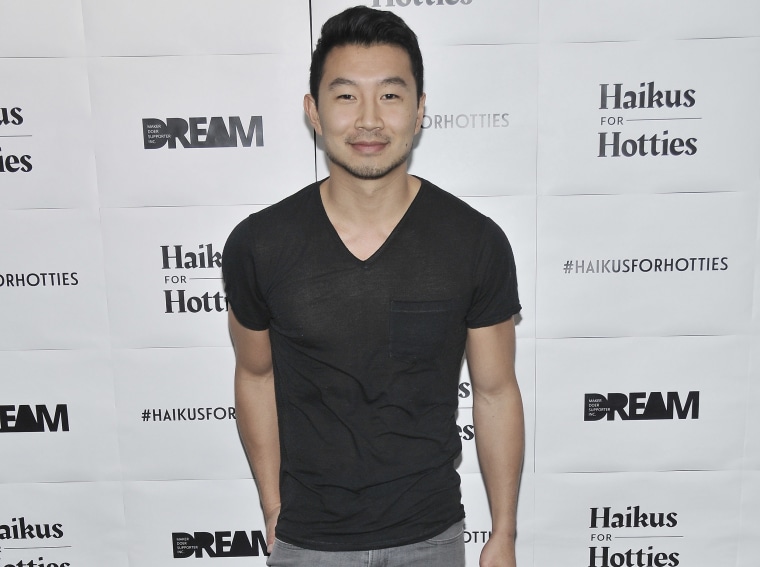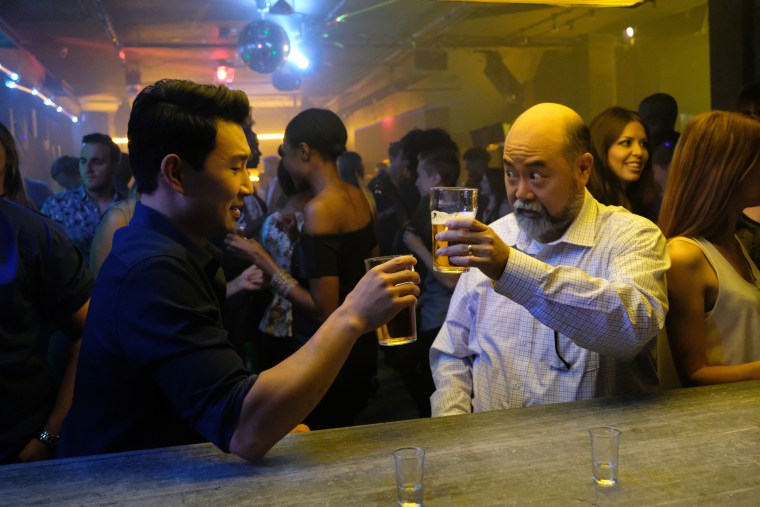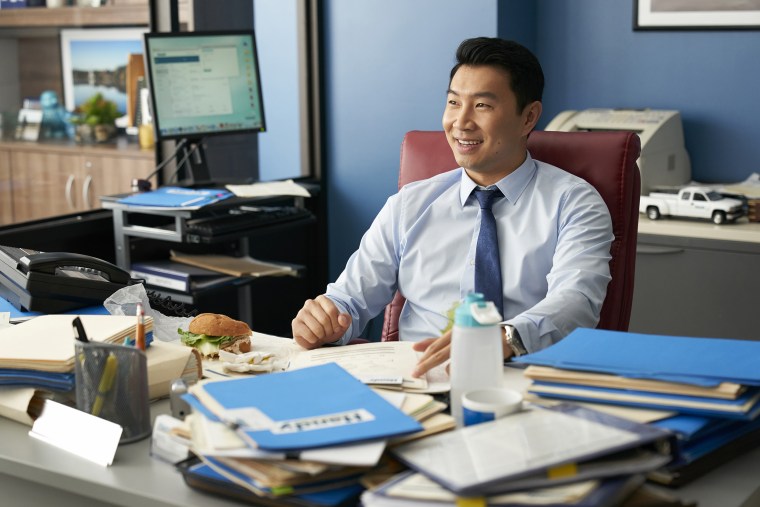“Generally, everything that’s sizable is already cast in L.A. So by the time it gets to Toronto, you’re auditioning for Desk Cop #3 or something — which was my first role,” Simu Liu says, before stopping himself. “Desk Cop #1, actually. Which was good!”
But that was 2012. This is 2018, where Liu has been co-starring in the hit Canadian television “Kim’s Convenience” since 2016. Based on the 2011 play by Ins Choi, who also works behind the scenes of the TV adaptation, “Kim’s Convenience” hit Netflix in July to rave reviews. The New York Times praised it, Vulture called it the “ideal” pure sitcom. For Liu, playing the handsome and once-rebellious Jung has been a breakout role he’s still thrilled to talk about.
Before answering fan questions, NBC Asian America spoke with Liu about his journey to “Kim’s Convenience,” how his mother’s 60th birthday led to a breakthrough in their relationship, and the role he wouldn’t say “no” to.
First thing I think everyone is dying to know: When does season three of “Kim’s Convenience” begin?
Season three comes out January of 2019. Usually we’re a fall premiere, but we got moved because one of Canada’s big shows just ended so there was some moving and shaking and they moved us from a 9:00 to an 8:00 time slot. Basically, it’s all good things. They’re moving us to a more favorable, more family-friendly time slot, and moving us into the winter when everyone is stuck at home anyways because Toronto winters are brutal and they’ll have no choice but to watch “Kim’s Convenience.”
Is there anything you can tell us about season three?
No. [laughs] I can say that it’s probably funnier than it’s ever been. I remember being on set for the first season and every day being scared we were going to get fired. And I feel like we all, to some degree, felt that anxiety because we knew how important the show was and none of us wanted to let it down or let each other down. We were all just so concentrated on not sucking that I think it was sometimes hard to have fun. What I’m noticing in season three is that we’re like, “OK, we know we’re here.” We know we’re probably going to go on for quite some time because we’re highly rated in Canada, so it was just an opportunity for us to get more comfortable in our roles and just kind of play and have fun.
How did you come to audition for the show?
I’d been working at it for a few years and was kind of still struggling, trying to make my way around. I was cast in a show in the prior year called “Blood and Water” and that was my ticket in, if you will. I was auditioning at the series regular level and I’d known about the play [“Kim’s Convenience”] being turned into a show. I was doing a play at the time for The Factory Theatre in Toronto and Ins Choi, who wrote the play and is the co-showrunner of the show, showed up one day to rehearsal and was just like, “Hey I just wanted to meet you.” And he’s this great, generous human being who I learned later traveled around the country just to meet all of the talent in Canada. A lot of the stars were cast from Vancouver, Calgary, and he just went and sat in on improv shows, plays… and a few weeks later, I got the call to come in.
Let’s talk a little bit about you and how you got into the industry. I think I read that you originally went to business school…?
Yeah, I went to business school and I actually worked as an accountant for about eight months. It’s not what I wanted, but it was definitely a move to appease the parents. That, to me at the time, was what it meant to be a fully functional adult. Things like “following your passion” and “finding your creative outlets” didn’t mean anything to me because I didn’t have that area of my brain. So I thought I did the right thing. I thought I got a nice job where I’d be able to put on a nice shirt every day, go to work, and I thought that would be fulfilling, but it wasn’t. And very quickly I think that started to show in my job performance and I was laid off about eight months in.
So on a whim, I just started applying to these background acting jobs. The first set I ended up on was Guillermo del Toro’s “Pacific Rim” that was shooting in Toronto and they needed a bunch of Asian extras, and for some reason they put their ad on Craigslist. I picked it up and showed up on set and just got blown away because it was hundreds of people, this big machine, $200 million dollar movie … but everybody wanted to be there. It was very different than being in an accounting office. It kind of opened up something inside of me, so I just started to lean into that. I would do background and extra stuff, I would do student films, I just found every opportunity I could to be on set, and after awhile I accumulated enough work to get an agent.

What would you consider your breakthrough role — the one where you felt like you had really “made it”?
I’ve felt that on so many levels, but then a week later will be like, “Well...” Like, I thought that when I booked my first TV role that it was the biggest deal in the history of big deals. And I only had two lines! I would pop in and say, [in an accent] “Inspector. You have a call from headquarters” — because it took place in Hong Kong. So I was like, “Yes! I made it, this is awesome!” And then I woke up the next day and was like, “OK, what’s next?”
“Blood and Water” was a big one for me. It was a show about a Chinese-Canadian family in Vancouver and it was spoken both in Mandarin and in English. Because they had that requirement for casting, I was the only guy who could do it and they had to cast me. So I ended up getting my first series regular role there. It debuted on a tiny Canadian channel, nobody watched it, but at the same time I was able to put it on my resume and I got a couple of great reel pieces. We ended up getting nominated for a bunch of awards in Canada, so that helped boost my profile a little bit and helped me get swept up into “Kim’s.”
If those two were my two previous breakouts, “Kim’s” is the big breakout. It’s kind of eclipsed all the rest.
As you get further into your career, do you feel any anxiety when it comes to discussing representation and, in some ways, representing for such a large and diverse community with the projects you’ve been part of?
It’s just a thing — the fact that we’re in our third season and we’re still getting questions like, “How important is it that a show like ‘Kim’s Convenience’ is on the air?” And you think about all these other actors promoting their shows — they’re talking about the show, they’re talking about the characters. Meanwhile, we have to make these sweeping political statements. But I think it comes with the territory. It speaks to where we are as a whole in our representation and our voice at the current time. That being said, it’s a stepping stone to hopefully, one day, actors of color being able to answer questions about their show in the same way that anybody would be able to. I’m sure we all know we’re not there yet, and questions like the “diversity questions” are telling of that. But at the same time, I would rather they ask them then not having the show on air or not casting us at all.
I wanted to jump back a little and ask you about this letter you wrote to your parents last December…
Oh, we’re just going right into this one. [laughs]
Yep, no holds barred! I was reading it and I almost couldn’t help but draw similarities between your experience with your parents as kid and a little bit of what Jung and Appa go through on the show. What inspired your letter?
The short answer is: My mom turned 60. I sat in front of this card and I was going to write the same thing I write every year and say the same things I say every year when I go to see them, and it was always like putting out a fire. If there was a tinder of something that might come up that would be problematic, we would just not acknowledge it or just sweep it away and not let those conversations happen. But the truth of the matter is just because you don’t talk about them, it doesn’t mean everything is OK. The real truth of it is that I carried this weird kind or resentment with me of my parents through my childhood knowing full well they had sacrificed everything for me, that they had assumed great risk to come here and had given up everything to build a life in Canada.
But it was still like, “There are moments where you really hurt me deeply,” and I don’t think we ever really talked about that. In order for us to move on and to have a better relationship, we needed to talk about that. So for my mother’s 60th birthday, I opened up all these cans of worms and I wasn’t trying to lay into her in a way that was like, “Here’s all my emotional baggage.” I tried to come from an angle of, “If I don’t say these things now, I don’t know when I will have the time to,” and I’d rather say them now because I feel like we still have so much time ahead of us.
My mother and I have always had a very, very complicated relationship but ever since I wrote that letter, it’s been crazy how we’ve progressed just as two people. I took my mom out for Mother’s Day alone for the first time in our lives and we were just talking, just speaking as friends.

Do you draw from your own personal experiences for Jung? This is also one of the questions from a fan for the video we’re doing later, but how much input do you all have into your characters and the choices they make?
We really don’t. The thing is: we shouldn’t. If you asked me what I’d want more of, I would say, “Well, I want more Jung and Appa. I want every scene to be about how fractured that relationship is so I can explore that for my own personal catharsis.” But then it wouldn’t be a comedy! At the end of the day, it’s a CBC half-hour family sitcom, and as much as the relationships and the authenticity of that need to flavor the story, at the end of the day we need to see these people have fun.
Switching gears here: “Crazy Rich Asians.” How many times have you seen it? I feel like every time I’ve seen you on social media, you’ve been at a theater encouraging people to see it.
This is kind of what we talked about earlier, right? Being this “poster boy” for diversity. When “Crazy Rich” came out, I did not necessarily go out and be like, “I want to get in the headlines for a movie that I’m not in!” But then my publicist would be like, “You got a call from the Canadian Associated Press. You got a call from this place, from that place.” It was always about “Crazy Rich Asians.” They wanted somebody “of that persuasion” to comment on it. It piqued something in me where I was like, “I should be supporting this. I should be leaning into this.” So a cast member [Andrew Phung of “Kim’s Convenience”] and I publicized the screening we were going to and we ended up selling out that theater.
I’ve seen some lobbying online from fans who want to see you in the next movie.
Yes! I think the guy’s name is Carlton? I don’t know too much about him other than the fact that he’s crazy and he’s rich and he’s Rachel’s half-brother. I look forward to reading the sequels – because I’ve only read the first book — and learning more about this character because I wouldn’t say no!
OK so you act, you’ve done stunts, you write and produce, and you also sing the national anthem from time to time … What’s the next big goal for you?
My big aspiration is to walk into NBCUniversal and have them buy my movie. That’s what I want to do. I think the success of “Crazy Rich” has opened up a lot of doors for all of us and I think the biggest thing it’s done is it’s identified a market where there was no market before: Asian American. This is something that, for some reason, has taken studios forever to kind of wrap their heads around — that this is a market that’s separate and distinct from Asia, and they have very different needs and very different wants for what they see on screen, for what they consider to be accurate representation. So I think just the fact that it did so well puts a pin on the map. This is a market now. This is a thing now. So my aspiration is to be more of a creator rather than just somebody who waits for the opportunity to come. I want to be able to tell the stories and I think we all have a lot of stories to tell.
This interview has been edited for length and clarity.
Follow NBC Asian America on Facebook, Twitter, Instagram and Tumblr.

